- Branche: Agriculture
- Number of terms: 87409
- Number of blossaries: 0
- Company Profile:
Established in October 1945 with the objective of eliminating hunger and improving nutrition and standards of living by increasing agricultural productivity, FAO coordinates the efforts of governments and technical agencies in programs for developing agriculture, forestry, fisheries, and land and ...
The conversion of atmospheric nitrogen (N<sub>2</sub>) into oxidized forms that can be assimilated by plants. Biological nitrogen fixation is catalysed by the enzyme nitrogenase, which is found only in prokaryotes. Certain blue-green algae and some genera of bacteria (e.g., <i>Rhizobium</i> spp.; <i>Azotobacter</i> spp.) are capable of biochemically fixing nitrogen. Such bacteria are very important symbionts for plants growing in nitrogen-poor soils.
Industry:Biotechnology
The conversion of one chemical or material into another using a biological catalyst: a near synonym is biocatalysis, and hence the catalyst used is called a biocatalyst. Usually the catalyst is an enzyme, or a whole, dead micro-organism that contains an enzyme or several enzymes.
Industry:Biotechnology
The corpus is found below the tunica (q.v.) and is a part of the apical meristem. In the corpus, cells divide in all directions, giving them an increase in volume.
Industry:Biotechnology
The covalent addition of sugar or sugar-related molecules to proteins or polynucleotides.
Industry:Biotechnology
The cowpox virus used to vaccinate against smallpox and, experimentally, as a carrier of genes for antigenic determinants cloned from other disease organisms.
Industry:Biotechnology
The creation of identical copies of an adult animal by nuclear transfer (q.v.) from differentiated adult tissue. <i>See also</i> cloning; Dolly.
Industry:Biotechnology
The creation of identical copies of an embryo by embryo splitting (q.v.) or by nuclear transfer (q.v.) from undifferentiated embryonic cells.
Industry:Biotechnology
The creation of proteins from their constituent amino acids, in accordance with the genetic information carried in the DNA of the chromosomes.
Industry:Biotechnology
